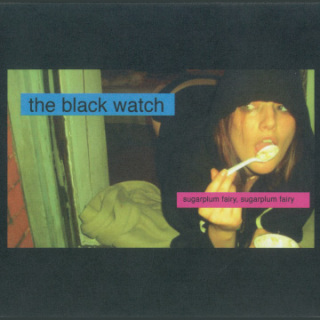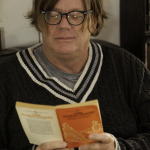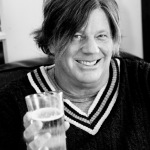black watch: Sugarplum Fairy, Sugarplum Fairy CD (Pop Culture Press Records)
Release date: January 27th, 2015[wpdm_file id=31]
Bio: 2014 finds Los Angeles indie pop outfit the black watch releasing their umpteenth LP, Sugarplum Fairy, Sugarplum Fairy on Austin’s Pop Culture Press (an offshoot of the ‘90s music ‘zine of the same name). The follow-up to last year’s well-received the end of when, the new album was recorded very quickly, with principal TBW songwriter John Andrew Fredrick playing every instrument save the drums--which were handled by North Hollywood-based engineer Luke Adams (who’s manned the kit for the likes of Pete Yorn, Dave Stewart, and Hillary Duff).
The band continue as a working/gigging quartet, yet Fredrick—in the wake of the departure, after six years, of lead guitarist/co-vocalist extraordinaire Steven Schayer—felt like making a record (almost) by himself. When asked to explain why, Fredrick avers that somehow it seemed easier that way; “and besides,” says he, “the new album started off a quiet solo acoustic thing, with just acoustic guitar and piano, then morphed into a raw, raging guitar thing.”
Mixed by longtime TBW producer Scott Campbell (Stevie Nicks, Carina Round, Acetone) the end result you may find to be something of a dialectic between the two—which makes sense in light of the fact that Fredrick has often declared his undying love for the band that’s influenced most preponderantly his writing and recordings for more than twenty-five years—the little group that in 1968 made a double album of acoustic songs interlarded with raucous rockers: The Beatles. And of course Sugarplum Fairy, Sugarplum Fairy quotes directly the sleepy (or druggy) count-off John Lennon employed on the “A Day in the Life” outtake that made it onto The Beatles Anthology 2.
Something of a perennial underground and “critics’ band,” the black watch have enjoyed—if that’s the proper term--a longstanding reputation as a “best-kept secret.” Yet with each release the pervasive feeling is that they have to introduce themselves all over again, anew. “If I spent my time puzzling out why people have a sort of amnesia when it comes to us, despite what has in all modesty been a pretty prodigious spate of productivity, I don’t know what,” Fredrick laughs. “Maybe if reviewers would stop with the ‘This band doesn’t get the credit it deserves ’ sort of lead-ins… And yet music journalists have been so kind to us down the years—and often in print themselves puzzled over our continued and utterly unaccountable [winks] obscurity, I imagine. We’d be lying if we said we didn’t care that after all this time we’re still a total cult band—but we don’t really care too much. Our former producer/guitarist Tim Boland often puckishly tells me that I’ll only get my due when I’m dead… Fortunately, I have an equally obscure career as a novelist to fall back on,” he chuckles again.
That cult status may change: 2015 will see the U.S./U.K. publication of John’s third work of literary fiction—and the sequel to 2013’s The King of Good Intentions (Verse Chorus Press), a raucously comical-satirical and poetic novel about a fledgling L.A. indie rock band in the early 90s. The book’s being issued by leading independent publisher Rare Bird Lit, whose young president, Tyson Cornell, coincidentally has just joined the black watch as Schayer’s replacement. The new TBW (longtime drummer Rick Woodard, Irish-American bassist Chris Rackard, Cornell, and of course Fredrick) have just returned from Santa Barbara where they recorded a couple of Byrds-meets-New Order twelve-string-driven songs for a seven-inch single. Santa Barbara: Fredrick’s home town, where he grew up, went to university, got a Ph.D. in English Literature, taught Freshman English, and started TBW with one of his students, a drummer—back in 1987. “The studio where we just did a the single with producer Craig Costigan—it’s right across the spot where the legendary Pat’s Grass Shack was, where we did our first gig, opening for Toad the Wet Sprocket. I broke a string on the very first song,” Fredrick sighs. “I sat down on stage in my kilt and swapped it out—so nervous! A psychiatrist I was friends with (big alternative music fan too) came up to me afterwards and said: ‘Toad is going to be a huge band, but you, John, are going to be something more --an artist.’ I never forgot that.”
The band continue as a working/gigging quartet, yet Fredrick—in the wake of the departure, after six years, of lead guitarist/co-vocalist extraordinaire Steven Schayer—felt like making a record (almost) by himself. When asked to explain why, Fredrick avers that somehow it seemed easier that way; “and besides,” says he, “the new album started off a quiet solo acoustic thing, with just acoustic guitar and piano, then morphed into a raw, raging guitar thing.”
Mixed by longtime TBW producer Scott Campbell (Stevie Nicks, Carina Round, Acetone) the end result you may find to be something of a dialectic between the two—which makes sense in light of the fact that Fredrick has often declared his undying love for the band that’s influenced most preponderantly his writing and recordings for more than twenty-five years—the little group that in 1968 made a double album of acoustic songs interlarded with raucous rockers: The Beatles. And of course Sugarplum Fairy, Sugarplum Fairy quotes directly the sleepy (or druggy) count-off John Lennon employed on the “A Day in the Life” outtake that made it onto The Beatles Anthology 2.
Something of a perennial underground and “critics’ band,” the black watch have enjoyed—if that’s the proper term--a longstanding reputation as a “best-kept secret.” Yet with each release the pervasive feeling is that they have to introduce themselves all over again, anew. “If I spent my time puzzling out why people have a sort of amnesia when it comes to us, despite what has in all modesty been a pretty prodigious spate of productivity, I don’t know what,” Fredrick laughs. “Maybe if reviewers would stop with the ‘This band doesn’t get the credit it deserves ’ sort of lead-ins… And yet music journalists have been so kind to us down the years—and often in print themselves puzzled over our continued and utterly unaccountable [winks] obscurity, I imagine. We’d be lying if we said we didn’t care that after all this time we’re still a total cult band—but we don’t really care too much. Our former producer/guitarist Tim Boland often puckishly tells me that I’ll only get my due when I’m dead… Fortunately, I have an equally obscure career as a novelist to fall back on,” he chuckles again.
That cult status may change: 2015 will see the U.S./U.K. publication of John’s third work of literary fiction—and the sequel to 2013’s The King of Good Intentions (Verse Chorus Press), a raucously comical-satirical and poetic novel about a fledgling L.A. indie rock band in the early 90s. The book’s being issued by leading independent publisher Rare Bird Lit, whose young president, Tyson Cornell, coincidentally has just joined the black watch as Schayer’s replacement. The new TBW (longtime drummer Rick Woodard, Irish-American bassist Chris Rackard, Cornell, and of course Fredrick) have just returned from Santa Barbara where they recorded a couple of Byrds-meets-New Order twelve-string-driven songs for a seven-inch single. Santa Barbara: Fredrick’s home town, where he grew up, went to university, got a Ph.D. in English Literature, taught Freshman English, and started TBW with one of his students, a drummer—back in 1987. “The studio where we just did a the single with producer Craig Costigan—it’s right across the spot where the legendary Pat’s Grass Shack was, where we did our first gig, opening for Toad the Wet Sprocket. I broke a string on the very first song,” Fredrick sighs. “I sat down on stage in my kilt and swapped it out—so nervous! A psychiatrist I was friends with (big alternative music fan too) came up to me afterwards and said: ‘Toad is going to be a huge band, but you, John, are going to be something more --an artist.’ I never forgot that.”





